2008 年 10 月翻译资格二级英语口译实务真题及答案
The Certificate of English Interpretation: Level Ⅱ
Now please listen to the instructions about this exam. I'll give you a brief
introduction before each part of the exam begins and leave you enough time to do
the interpreting.
Each part is divided into a number of segments and at the start of each segment you
will hear this tone . At each pause where you are expected to start interpreting,
you'll also hear this tone . You'llhear each segment only once.
Let's start with Part 1.
Part 1 Consecutive Interpretation: English to Chinese
In this part you will hear a speech delivered in English by Princess Cristina to
the Second WorldAssembly on Ageing. Please interpret this speech into Chinese.
Let's begin.
Ladies and Gentlemen,
It is my pleasure to address you as a United Nations Goodwill Ambassador to this
Second WorldAssembly on Ageing, an honour which I truly welcome, and one which has
provided me with an excellentopportunity to promote awareness of ageing. I
congratulate the Secretary-General of the United Nations, thechairmen and the
executive heads of the organizations of the United Nations system on their excellent
work,the Chairman and Vice-Chairmen of the Preparatory Committee on their dedication,
and the many individualswho have helped to make this Second World Assembly possible.
We are honoured to be hosting this world event in Spain. Our interest stems from
our realization thatthe ageing of the population presents a challenge for which we
must prepare ourselves and that we must beready to take advantage of the abilities
of older persons. Therefore, in offering to be the host country, Spainwished to
demonstrate its interest in policies for the integration of older persons and to
give impetus to aninnovative debate in our society.
We are living through a period of major demographic change. The elderly are ever
more numerous.That people are living longer and under better conditions, as a result
of social progress, is one of humanity'sgreatest achievements. Older persons are
a universal force with the potential to transform the future. Thisglobal
transformation is going to affect individuals, families, communities and virtually
�
every area of society.
Accordingly, we must prepare ourselves for this new challenge by promoting changes
in attitude towardsthis demographic revolution, which is taking place because of
the increase in the number of older personsin the world. Achieving a society for
all ages involves analysing society from a broader perspective andhighlights the
role played by relations between the various generations making up society.
Solidarity betweenthe generations in all areas of family, community and national
life is essential for social cohesion.
We younger people must be increasingly aware that, in order to move forward in
building a more just society, we must recognize the advances made by older
generations and value their experience and currentabilities appropriately. At the
same
coming
generations.Inter-generational solidarity is a natural setting within which
encounter, learning and exchange take placeamong individuals. It offers advantages
to all and helps in achieving a more integrated society.
transmit
values
be
able
such
to
time,
we
must
to
Together we will build a positive image of ageing, which should involve not simply
prolonging life, but also ensuring that old age is healthy, independent, active and
fully integrated in society. Ageing should be seen as astage in life during which
men and women can still develop their skills, as active agents in our societies,
in whichthey should continue to participate as full citizens with full social
recognition.
I hope that all the proposals that result from this World Assembly will enable our
society to face the challenges posed by the ageing of the population, and that they
will be translated into practice by the greatestpossible number of countries in such
a way that older persons will benefit from them as soon as possible.
Thank you.
That's the end of Part 1. Now we move on to Part 2.
Part 2 Consecutive Interpretation: Chinese to English
In this part you will hear a speech delivered by a Chinese official on China 'S
environmental protection and development policy at an international conference.
Please interpret this speech into English.
Let's begin.
女士们,先生们:
�
早上好!很荣幸参加此次论坛,与各位共同探讨环保与发展方面的问题。气候变化是环境问
题,但归根到底是发展问题。这个问题是在发展进程中出现的,应该在可持续发展框架下解
决。只有各方在促进自身发展过程中不断提高技术水平,积极建立适应可持续发展要求的生
产和消费模式,才能从根本上应对气候变化的挑战。
国际社会在推动减少温室气体排放的同时,要充分考虑如何应对已经发生的气候变化,增强
发展中国家特别是小岛屿国家和最不发达国家抵御灾害性气候的能力。环境保护是全人类的
共同责任。但是,我们要坚持联合国所确立的区别对待的责任原则。这一原则反映了不同国
家经济发展水平、历史责任、当前人均排放水平上的差异,是未来国际合作的基础。
根据这一原则,发达国家应该完成《京都议定书》确定的减排目标,向发展中国家提供帮助,
并在 2010 年后继续率先承担减排义务。不久前,欧盟决定到 2020 年将温室气体排放减少
20%。我们对此表示欢迎,同时希望其他发达国家也能做出类似承诺。
发展中国家工业化、城市化、现代化进程远未完成,发展经济、改善民生的任务艰巨。为了
实现这些目标,发展中国家的能源需求将有所增长。因此,在现阶段对发展中国家提出强制
性减排要求是不合适的。同时,我们发展中国家也应该在力所能及的范围内采取措施,为促
进全球可持续发展做出积极贡献。
国际社会要加强合作,使更多国家在发展经济的同时保护生态环境。要实现这一目标,国际
社会应该着眼未来,建立新的利益观和合作模式,积极开展务实合作。要加强研发和推广节
能技术、环保技术、可再生能源技术等,并使广大发展中国家买得起、用得上这些技术。
参考译文
Part 1
女士们,先生们:
我非常高兴能作为联合国第二次老龄问题世界大会的亲善大使在这里发言,这对于我来说是
一种荣誉,为我提供了一个绝佳的机会来帮助人们提高对老龄问题的认识。我要感谢联合国
秘书长,以及联合国各部门的领导者所做的出色工作,感谢筹备委员会主席、副主席付出的
努力,还要感谢为此次会议做出贡献的所有人。
此次会议在西班牙举行,我们感到很荣幸。我们之所以对这个问题感兴趣,是因为认识到了
人口的老龄化问题是我们必须准备应对的挑战,认识到了我们必须要发挥老年人的潜力。因
此,作为主办国,西班牙希望从政策上考虑老年人,并在全社会掀起对这一问题的大讨论。
我们正经历着人口结构发生重大变化的时期,老年人的数量比以往要多。随着社会的进步,
人们的寿命更长,生活条件也更优越,这是人类最伟大的功绩。老年人是一支普遍性的力量,
具有改变未来的潜力。这种普遍性的改变必将影响到个人、家庭、社会,以及社会的每一个
领域。
因此,我们必须要为这一新的挑战做好准备,改变对人口结构变化的态度,这种变化正是源
�
自于世界上老龄人口的增加。我们要创建一个服务于所有年龄结构的社会,就必须从更广阔
的角度分析社会,认真分析全社会不同代际之间的关系所扮演的角色。各代际之间在家庭、
社会与国家生活方面的和谐对于社会凝聚力来说是至关重要的。
我们年轻人应该更加认识到,为了建立一个更加公正的社会,我们必须承认老一代人所取得
的进步,重视他们的经验和现在的能力。同时,我们必须要把这样的价值传递给后代。代际
和谐是一种自然环境,在这个环境下人与人之间经常会发生碰撞、学习和交流。这对所有人
都有利,而且有利于建立一个更加融合的社会。
我们要共同树立老龄化的正面形象,它不仅仅是生命的延续,而且要确保老年人健康、独立、
积极、完全融人到社会之中。老龄应被视作生命过程中的一个阶段,在这个阶段无论男女仍
然可以发展技能,仍然是社会中的活跃分子,仍然作为完全的公民参与社会活动,得到全社
会的认可。
我希望此次会议上所形成的所有议案可以帮助我们应对人口老龄化带来的种种挑战,希望这
些议案被尽可能多的国家转化成实际行动,使得老年人可以尽快从中获益。
谢谢。
Part 2
Ladies and Gentlemen,
Good morning. It is my great honor to participate this forum to discuss environmental
protection and economic development with you. Climate change is an environmental
problem, but in the final analysis itis a developmental problem. It comes out in
the process of development and should be addressed within theframework of
sustainable development. While seeking self-development, we have to improve our
technicallevel and build up production and consumption modes conducive to
sustainable development. Only by doingthis, can we cope with the challenges of
climate change.
While promoting less greenhouse gas emission, the international community should
also consider how to respond to the existing climate changes, and to enable the
developing countries, especially the smallisland countries and the least developed
countries, to ward off disastrous climate. Environmental protection is a
responsibility shared by all human beings. However, we must adhere to the principle
of differentiated responsibilities, which is established by the United Nations. This
principle reflects the differences innational economic situation, historical
responsibility
for
futureinternational cooperation.
emission
level.
per
capita
basis
and
It
is
the
According to this principle, the developed countries should meet the emission target
identified by the Kyoto Protocol, provide assistance to the developing countries,
�
and continue to take the lead in reducingemissions after 2010. Shortly before, EU
decided to reduce 20% greenhouse gas emissions by 2020. Wewelcome it, and at the
same time hope other countries to make similar commitment.
The industrialization, urbanization and modernization in the developing countries
are far from being finished yet. Economic development and better livelihood are still
arduous tasks for them. To meet thesetargets, the developing countries have more
demands for energy. Therefore, it is inappropriate to force themto reduce emissions.
On the other hand, we developing countries must also try our best to take measures
tomake positive contribution to global sustainable development.
The international community should have more cooperation, so as to make sure more
countries can protect ecological environment while seeking economic development.
To meet this end, the internationalcommunity should look to the future, form a new
concept about benefits and find a new cooperation mode,and carry out realistic
cooperation. Efforts should also be made to intensify research and development and
toadvocate the new technologies such as energy saving, environmental protection and
renewable energy, and tomake sure that the developing countries can afford and apply
these technologies.
�
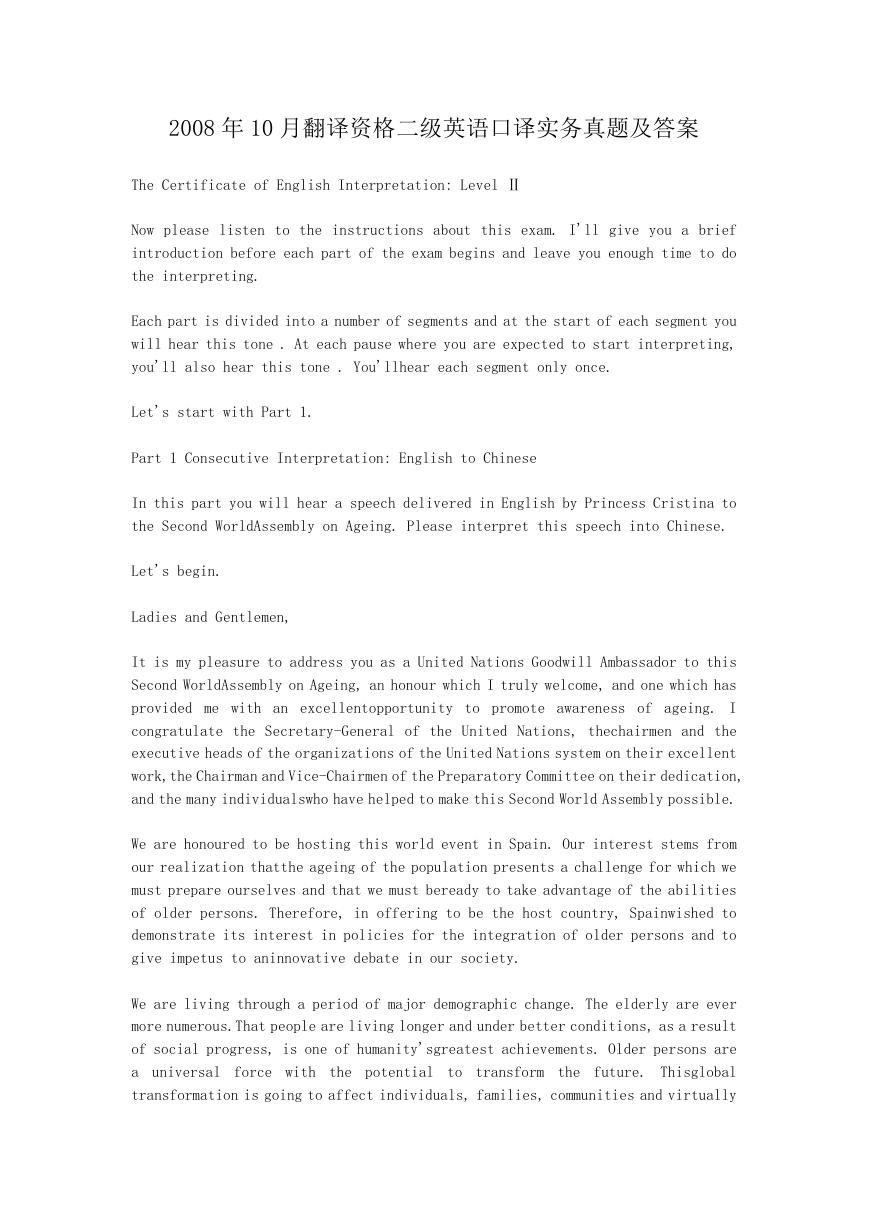
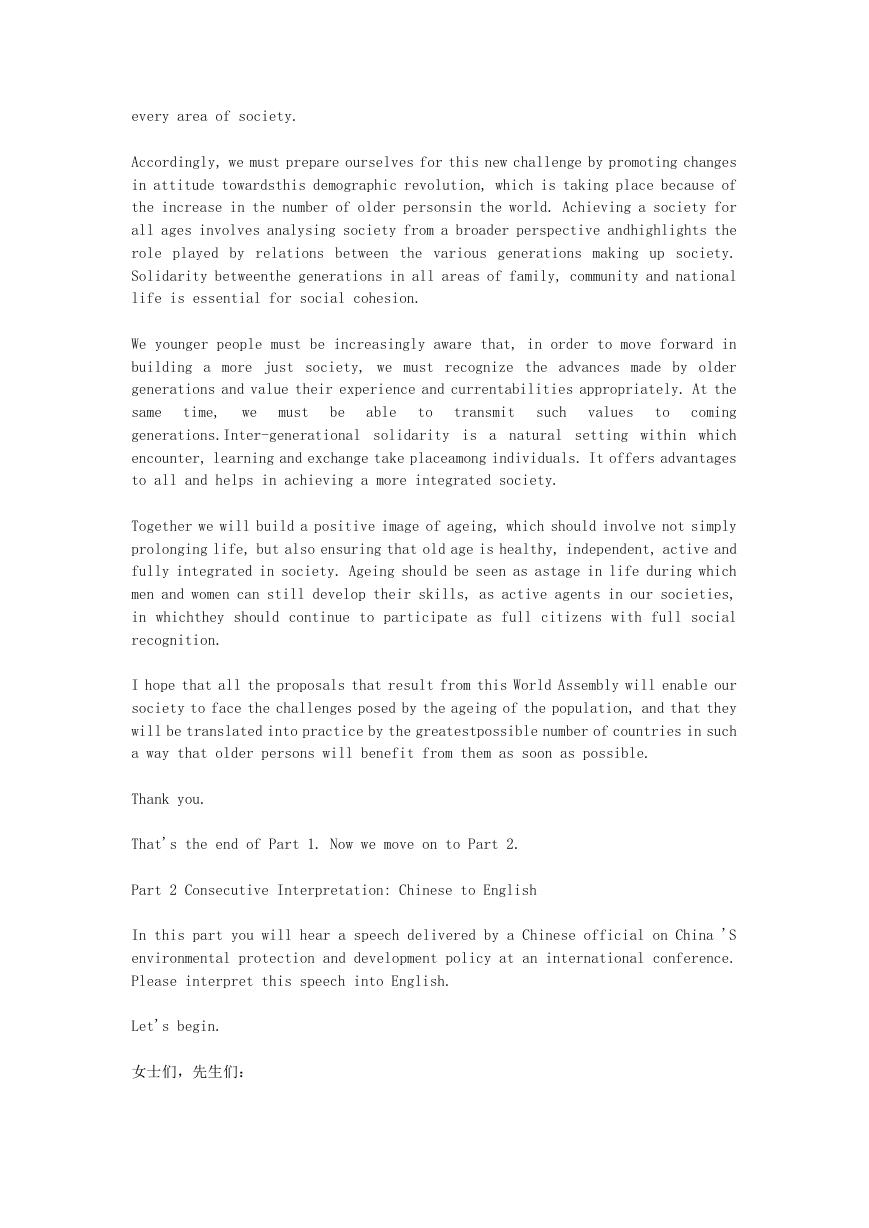
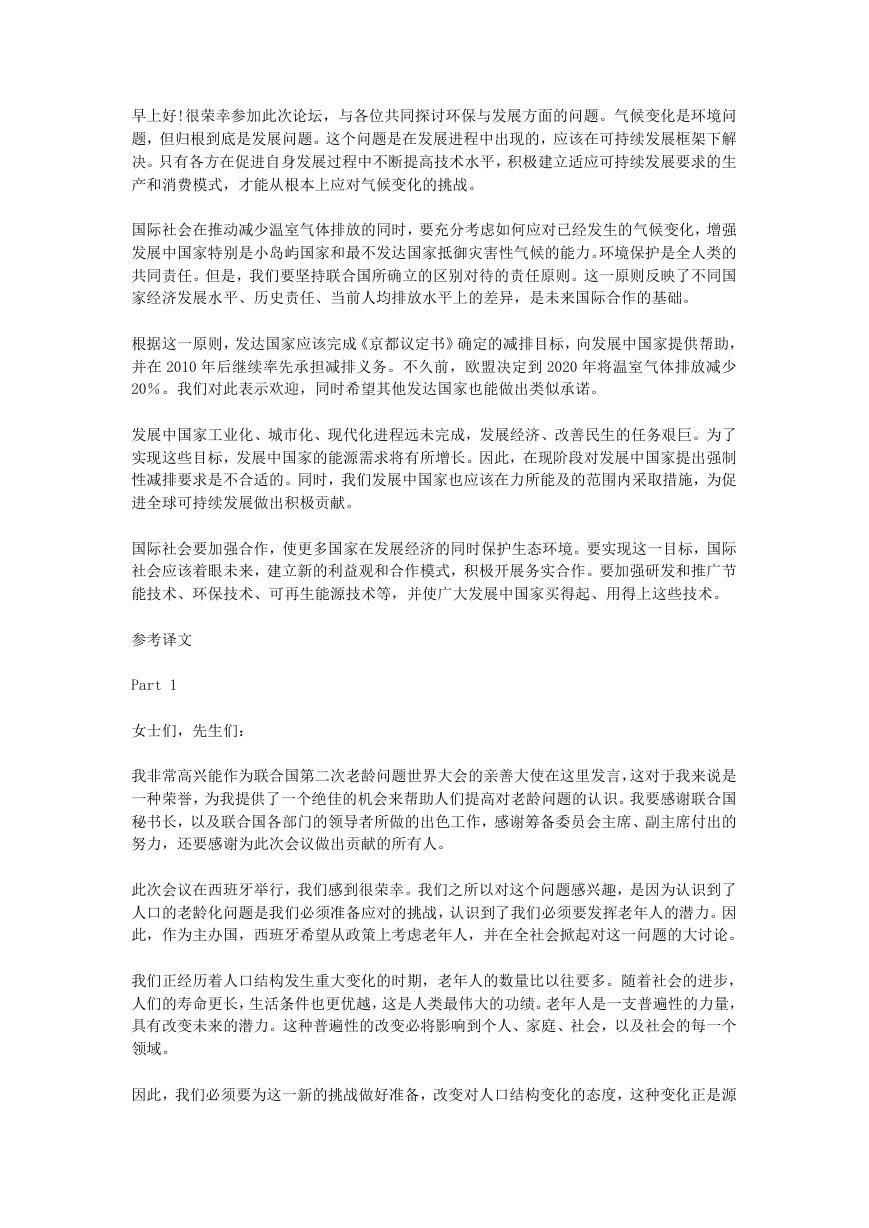
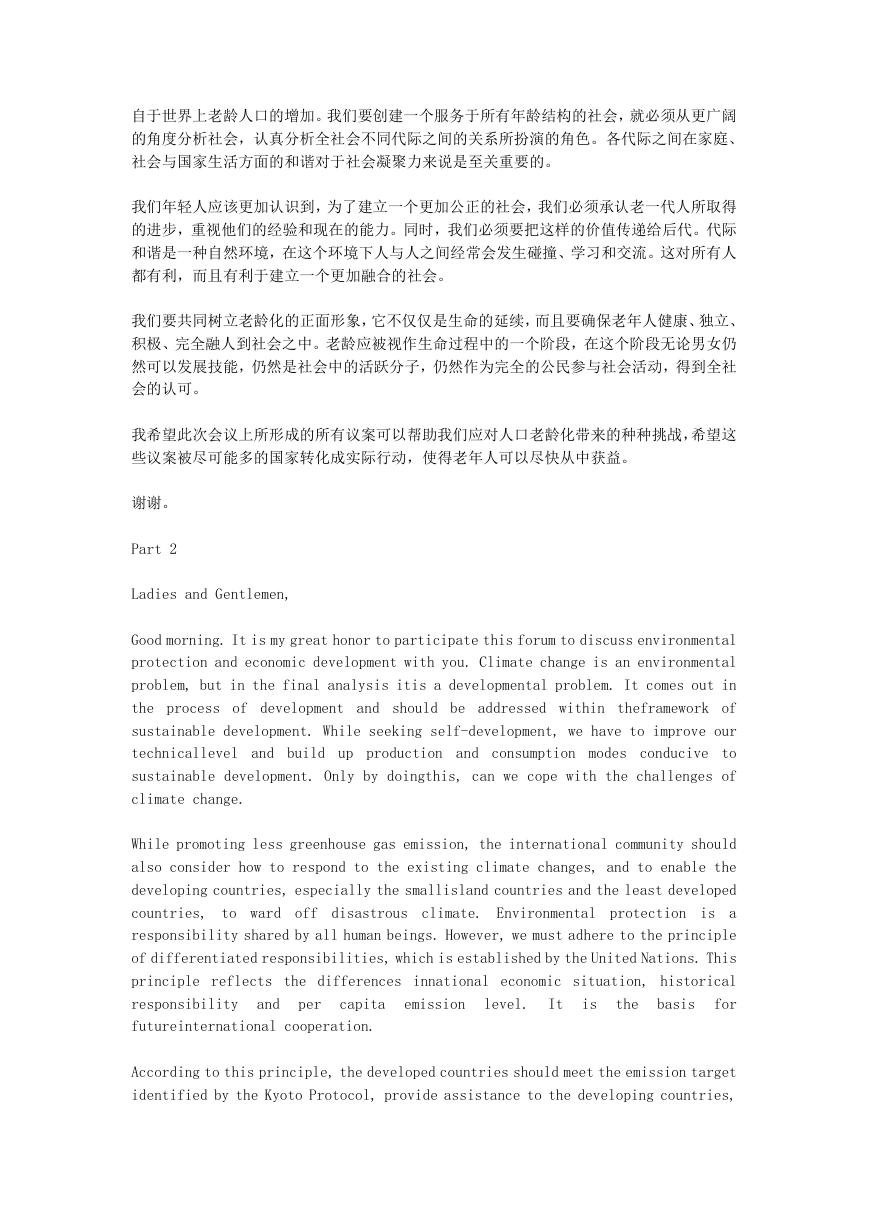
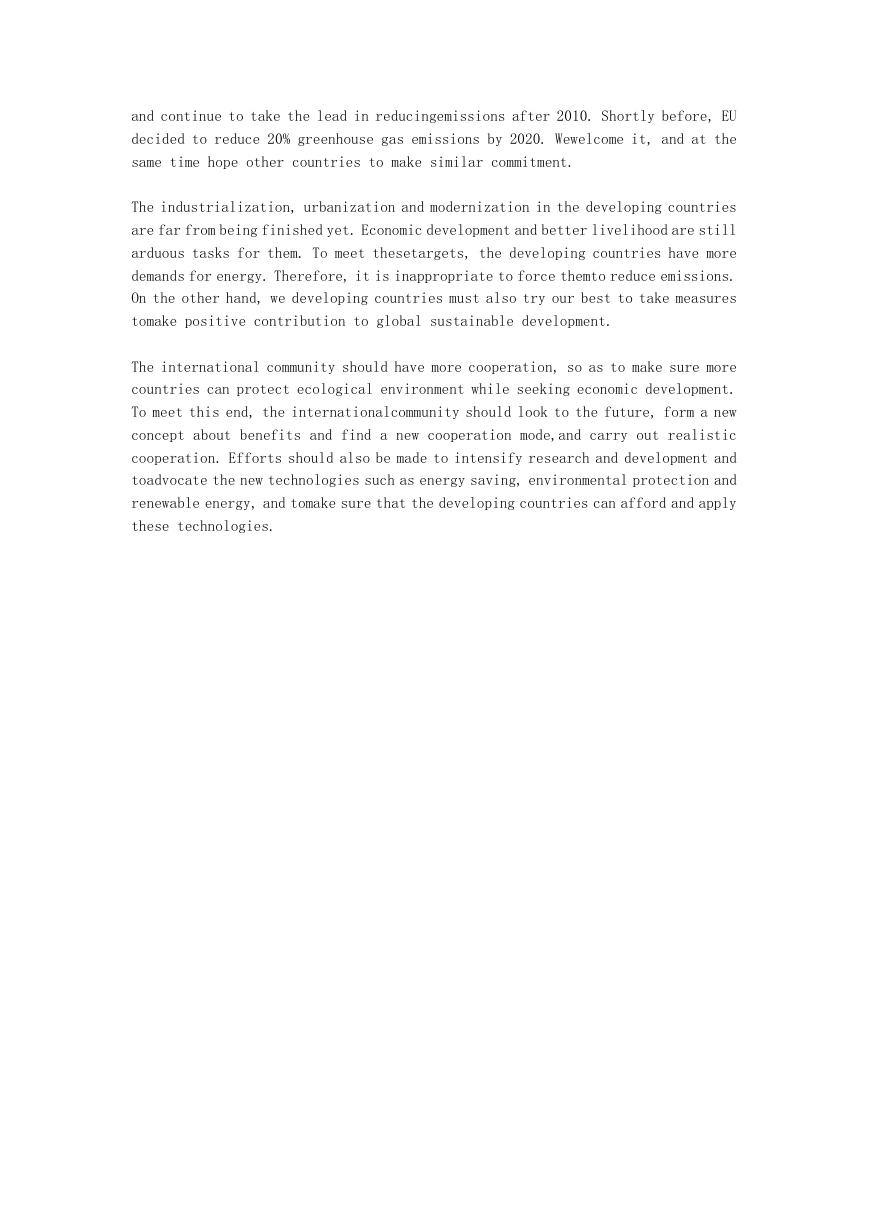





 2023年江西萍乡中考道德与法治真题及答案.doc
2023年江西萍乡中考道德与法治真题及答案.doc 2012年重庆南川中考生物真题及答案.doc
2012年重庆南川中考生物真题及答案.doc 2013年江西师范大学地理学综合及文艺理论基础考研真题.doc
2013年江西师范大学地理学综合及文艺理论基础考研真题.doc 2020年四川甘孜小升初语文真题及答案I卷.doc
2020年四川甘孜小升初语文真题及答案I卷.doc 2020年注册岩土工程师专业基础考试真题及答案.doc
2020年注册岩土工程师专业基础考试真题及答案.doc 2023-2024学年福建省厦门市九年级上学期数学月考试题及答案.doc
2023-2024学年福建省厦门市九年级上学期数学月考试题及答案.doc 2021-2022学年辽宁省沈阳市大东区九年级上学期语文期末试题及答案.doc
2021-2022学年辽宁省沈阳市大东区九年级上学期语文期末试题及答案.doc 2022-2023学年北京东城区初三第一学期物理期末试卷及答案.doc
2022-2023学年北京东城区初三第一学期物理期末试卷及答案.doc 2018上半年江西教师资格初中地理学科知识与教学能力真题及答案.doc
2018上半年江西教师资格初中地理学科知识与教学能力真题及答案.doc 2012年河北国家公务员申论考试真题及答案-省级.doc
2012年河北国家公务员申论考试真题及答案-省级.doc 2020-2021学年江苏省扬州市江都区邵樊片九年级上学期数学第一次质量检测试题及答案.doc
2020-2021学年江苏省扬州市江都区邵樊片九年级上学期数学第一次质量检测试题及答案.doc 2022下半年黑龙江教师资格证中学综合素质真题及答案.doc
2022下半年黑龙江教师资格证中学综合素质真题及答案.doc